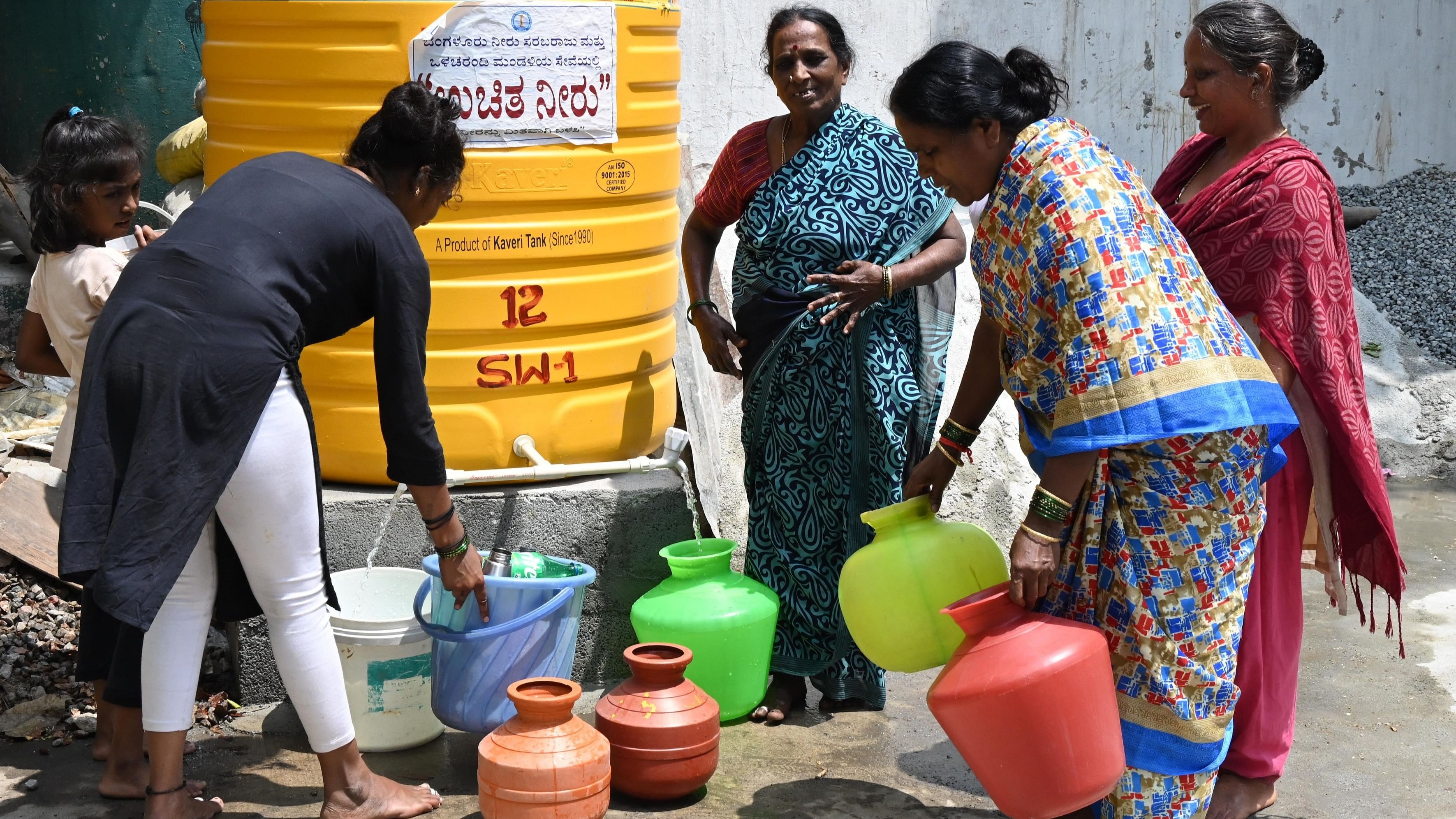
Women fill water amid a water crisis in Bengaluru.
DH FILE Photo /B K Janardhan
Bengaluru: The looming water crisis driven by various factors from deforestation and overexploitation to climate change will cost 14.34% of India's GDP by 2050, the latest report of the Global Commission on Economics of Water (GCEW) warned, noting that globally 290 crore people and 55% of the food production is under threat.
The Commission convened by the Government of the Netherlands and facilitated by the Organisation for Economic Co-operation and Development (OECD) said new assessments indicate a concerning global trend of near-universal water stress. Its report titled 'The Economics oF Water: Valuing the Hydrological Cycle as a Global Common Good', said virtually no people or agriculture exist in locations that do not have water-related stresses.
A region is likely to endure some level of water crisis if it is exposed to at least one supply-side stress factor (aridity or declining TWS or groundwater scarcity) or one demand-side stress factor (high population or cropped area oir low human development index score).
Referring to the finding that the share of arable land experiencing extreme water loss is estimated to increase by 50% under future climate change, the study's appendix said: "Current levels of irrigation as well as further irrigation expansion could cause large water storage losses in isolated regions, particularly northern India and eastern China, both of which are key to food security today."
Policies need to be rehauled
The current policies have failed to protect water as a resource. Among the major drivers of decline in TWS is the overexploitation, aridity, groundwater depletion on the one hand and deforestation for non-forest use, including agriculture that in turn depletes water, climate change and other factors were worsening the condition.
“Today, half of the world's population faces water scarcity. As this vital resource becomes increasingly scarce, food security and human development are at risk — and we are allowing this to happen,” observed Johan Rockström, Director of the Potsdam Institute for Climate Impact Research (PIK) and one of the Commission’s four co-chairs.
The model adopted for the study focussed on how rainfall and water storage impact economy by incorporating results based on 'moderate climate change scenario' or intergovernmental panel on climate change's (IPCC) pathway 4.5. Ignoring the trends in TWS risks underestimating the economic impacts of shifting hydrological conditions. By 2050, the cost of doing nothing will be too huge as climate change and TWS will have a combined impact on the economy.
"Agriculture accounts for 70% of freshwater withdrawals globally. Studies find that agriculture has also been responsible for about 70% of the deforestation in tropical and subtropical regions," the study noted, stressing the need to couple innovations for water productivity with policy measures to reduce overconsumption to mitigate the crisis.
Notably, the poorer a country, the higher the impact forecast by the study. For instance, low income countries may lose 15.33% to 18.90% (mean value 15.47%) while lower-middle income countries like India may lose 13.90% to 25.15% (mean 14.34%).
"(The results) are driven by explicitly modelling rainfall effects, made possible by better data and more comprehensive methodology. Outcomes might appear high compared to some results in literature," it said.
Solutions to avoid crisis
The study called for a new round of revolutions in food systems to scale up water technologies that boost water efficiency, spread regenerative agriculture, reduce reliance on nitrogen-based fertilisers and shifting from animal to plant-based diets.
Conservation of natural habitats, establishing a circular water and enabling clean-energy with low-water intensity were recommended as other missions.
Creation of Global Water Data Infrastructure to empower stakeholders with access to blue and green water data, a market-based disclosure of corporate water footprints, regulatory standards on water disclosures, policies to value water as a natural capital and just water governance were among the measures recommended by the study.
It also called for establishing a circular water economy , citing among other examples Bengaluru apartment complexes using treated water for non-potable purposes and selling excess water to industries.